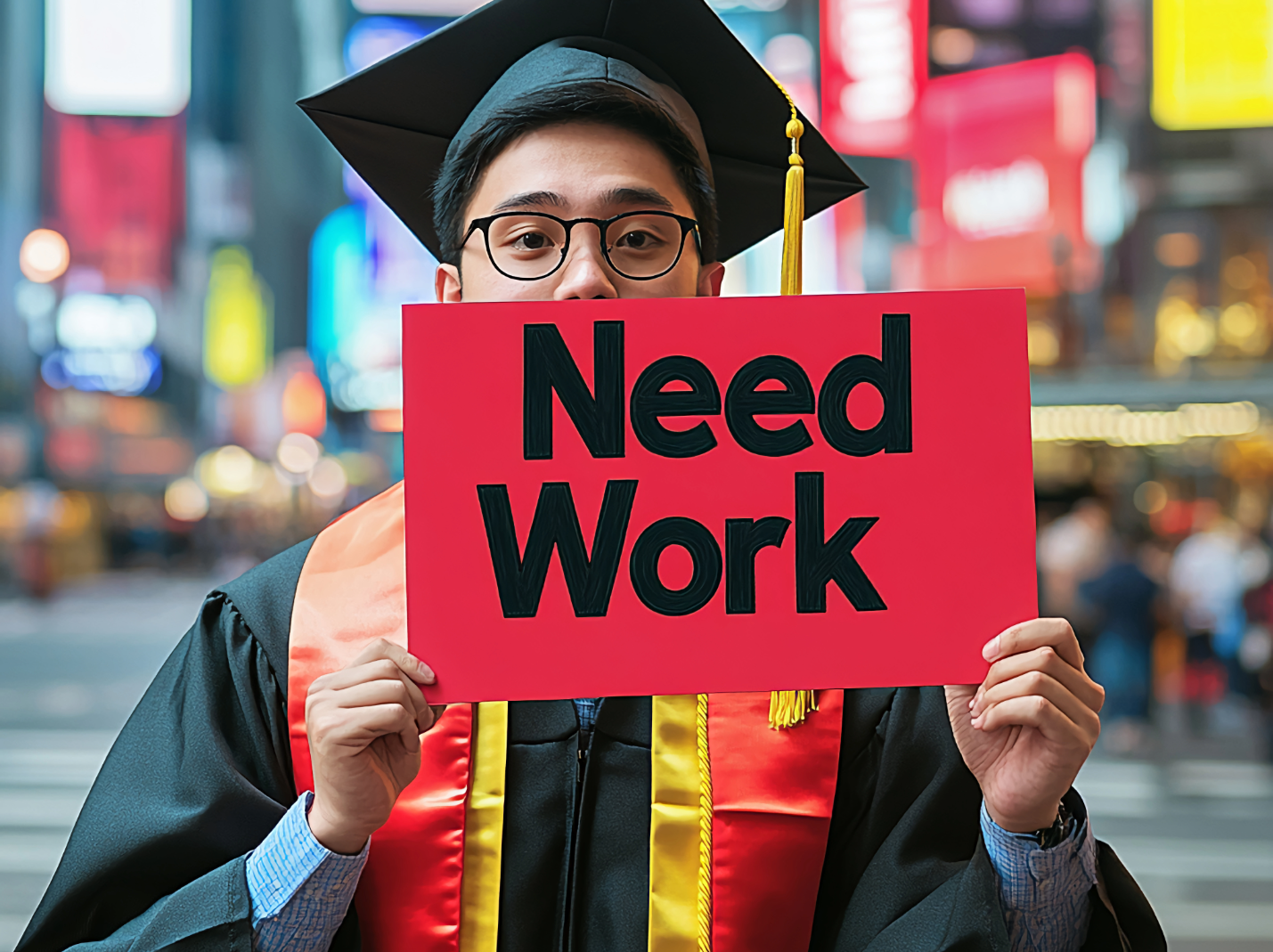
Author’s Note: This article is from my weekly “Top of Mind” email, sent to subscribers every Thursday. For more content like this and to receive the full newsletter each week, enter your name and email under “SIGN UP FOR OUR WEEKLY NEWSLETTER, ‘TOP OF MIND,’” located on the right-hand side of the site.
“I’m 22 years old, just graduated and I’ve been applying to jobs for almost three months now,” says Reddit user TheDearlyt. “Honestly, it’s been super discouraging.”
Young people who follow society’s playbook—go to college, study something, land a job—are finding that playbook falling apart in a brutal job market.
Recent data from Oxford Economics shows that college graduates, who make up just five percent of the labor force, account for 12 percent of the 85 percent rise in unemployment since mid-2023. Their unemployment rate sits at six percent—that’s above the national average of just over four percent.
And this time, it’s not just the arts majors feeling the sting. Even tech and business graduates—long considered safe bets—are struggling.
[RELATED: WATCH: Credentialism’s Toll on American Prosperity]
“AI was designed to replace the average coder, and it has done that fairly well,” John M. Veitch, Ph.D., CFA, Dean of the School of Business and Management at Notre Dame de Namur University, told me.
Entry-level coding jobs are being deleted just as tech-heavy graduates flood the market. Business programs aren’t faring much better. “Business schools must scramble to address the same problems as computer science across its majors,” Veitch said. Junior finance roles are disappearing from the ledger, marketing is increasingly driven by data analytics, and logistics has been upended by geopolitical instability. (Minding the Campus contributor Joe Nalven has examined the AI-driven decline in tech job prospects. One electrical engineering student he spoke with admitted, “I’ll take anything I can find.”)
Universities, Veitch believes, should not serve primarily as credentialing systems for the workforce. And employers need to get the memo.
They still treat the college degree as a default signal of competence even as its value continues to erode. (Employers also set unrealistic expectations for entry-level roles—but that’s a conversation for another time.)
Employers need to “stop relying on the college degree as a signal of employability,” George Leef, Director of External Relations at the James G. Martin Center for Academic Renewal, told me. Instead, he says, companies should “start ‘fishing upstream’—try to interest young people in your industry while they’re still in high school, pointing them to the kinds of study and training they’ll need.”
The degree, Leef argues, once stood for trainability and initiative. Now, it often signals “unrealistic expectations and bad attitudes.”
And this message must reach students before they commit to more schooling as the solution to their joblessness. When the economy slows, MBA and other advanced program applications tend to rise, as people hope that another degree will provide a new trajectory. “Universities are always a ‘résumé filler’ during downturns,” Veitch says, but that doesn’t mean they produce better outcomes.
Leef is more direct: “College was never really a ‘safe haven’ while the employment market was unfavorable, but that notion is patently false today.” The cost, he argues, simply outweighs the benefit. “College is not the best path for most young people. Those who ought to go to college are students who want to get into professions like law or medicine”
“For everyone else, he told me, “college is apt to be a high-cost, low-benefit proposition.”
The solution to this problem is at least threefold: Colleges should stop marketing themselves as job-prep factories. Employers should stop requiring degrees for roles that don’t truly need them. And society needs to shake the stigma around alternatives like apprenticeships, vocational training, and industry certifications. These paths are often faster, cheaper, and better aligned with real-world demand, but remain under-promoted.
[RELATED: America’s Obsession with Diplomas Is Killing Opportunity]
To be sure, higher education still has value.
As Veitch affirms, a university education is “about providing long term skills that allow individuals to meet the challenges they face throughout life. A good writer will still outperform AI when it comes to structuring a prompt … [and] broad areas of knowledge produces not just a better employee, but a person who is better equipped to be a good citizen.”
But most students don’t enroll for civic development—they enroll expecting jobs. And many leave disillusioned.
The college degree is no longer—if it ever was—a reliable on-ramp to the workforce. It’s an expensive detour. Companies must stop treating it as a stand-in for skills, while students must stop seeing it as their sure path to employment.
Until both sides recalibrate, we’ll keep sending young people straight to the unemployment line.
Follow Jared Gould on X.
Image by Inspire Shots Hub on Adobe Stock; Asset ID#: 1236464036

We are approaching the 6 month mark of Trump’s job market and economy. He will be owning the results. I doubt that the recent crop of grads is too happy with that.
I was with a crowd of STEM grads recently. They seemed happy to be at graduation, as usual. But pensive about the economy.
There would be a lot more jobs for STEM graduates if we severely curtailed the H1-B visa program. That program is nothing more than the white collar equivalent of the open border policies to get cheap unskilled labor.
And please, don’t tell me the H1-B visa program is getting the “best and the brightest” from places like India. Take some time and look through the job postings on linked-in. You’ll see companies looking for entry-level engineering jobs with the phrase “will consider sponsorship” in the job advertisement. Wonder what that means. I can only conclude places like UCLA or the University of Georgia aren’t turning out qualified engineers anymore.
I have written about the H-1B program. I critique just as you do.
“college graduates, who make up just five percent of the labor force, account for 12 percent of the 85 percent rise in unemployment since mid-2023. Their unemployment rate sits at six percent—that’s above the national average of just over four percent.
It’s more than that — while there are actually six “unemployment rates”, it is the U1 rate that is quoted as “the” unemployment rate and that consists only of those who are currently receiving unemployment insurance checks — and recent graduates aren’t eligible for those.
(The current U-6 unemployment rate in the United States is 7.8% as of May 2025.)
To receive UI, one must (a) have been laid off from an eligible job *and* it is 1/2 of the highest average earnings of two of the past five quarters, excluding the current — and those too must have been eligible jobs. (A job where the employer paid the UI tax on behalf of the employee — student employment is exempt.)
So a recent graduate who had a non-student job in June, July, & August of 2024, got hired after graduation and then laid off would be eligible but that’s not many.
Advice not to prepare for careers in college. This is horrendous, nihilistic, vandalistic advice. I hope no student ever listens to this.
Please explain.
Anyone who can use google can find that, on average of course, a college degree has had a pretty steady, very substantial earnings premium. Of course, most students of chamber music have a much harder road than students of electrical engineering.
‘Colleges should stop marketing themselves as job-prep factories.’
This is terrible, cynical advice. In the first place, decent colleges haven’t been
“marketing themselves as job-prep factories.” I’ve never heard any professor advocate for “college for all.” Most have not even heard of the idea.
Colleges should be helping qualified, motivated students to find something that they want to engage with in school, then work on meshing their interests with something marketable in a career.
The sour, bitter tone of the likes of George Leef is not helpful to anyone. Cynical, bitter students are not needed.
Anyone who can use google can find that, on average of course, a college degree has had a pretty steady, very substantial earnings premium.
That involves lifetime earnings and is based on a study that was done at least a few decades ago — it involves the lifetime earnings of those who went to college in the 1940s, 1950s, and 1960s. Not today.
And the studies of recent college graduates indicate that — if you look at the median and mode so as to avoid outliers — those who went into the trade are making MORE than the college graduates. And then when you factor in the four year opportunity cost and the cost of college and you will find they make a LOT more.
Young men have figured this out and it is why they aren’t going to college anymore.
Of course, most students of chamber music have a much harder road than students of electrical engineering.
Did you not notice the electrical engineer, above, who said she would take any job she could find?
In the first place, decent colleges haven’t been “marketing themselves as job-prep factories.” I’ve never heard any professor advocate for “college for all.” Most have not even heard of the idea.
Professors are not the only people employed by your college. You have an admissions office that has reps who visit high schools and such. My guess is that you also have “enrollment management” folk as well.
THEY are the ones marketing your college as a job prep factory.
Colleges should be helping qualified, motivated students to find something that they want to engage with in school, then work on meshing their interests with something marketable in a career.
I thought you said that they shouldn’t be job prep factories….
Cynical, bitter students are not needed.
Because only naive ones will believe the lies…